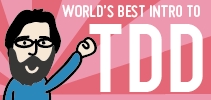No, Estimates Are Not Evil
No, estimates are not evil. I beg you not to limit yourself to trying to categorize estimates as entirely good or entirely evil. I don’t have the energy to argue with people who limit themselves to such superficial analysis. This nonsense tires and bores me, so please let’s move on.
I counsel against task-level estimates. Although concise, stating my position this way has caused some problems, so I’d like to add some detail. I see many groups in the typical enterprise context battling each other over the accuracy of estimates. I’m trying to get them to stop. These fights have wasted a significant amount of time, energy, and money, and haven’t led particularly well towards improving the situation. Although these groups have some serious problems, they fixate on this one, particular symptom, which they interpret as “inaccurate estimates”. (They’re not inaccurate, but I’ll save that for a future article.) This fixation causes real damage that affects the people involved, and that’s why I care about it at all. If it didn’t cause people to grow to hate the software industry and ask me for help preparing them to get out, then I wouldn’t feel as strongly as I do about it.
This fixation not only doesn’t lead to solving the underlying problems, but it also creates problems of its own. The people involved seem blind to how the estimates get in the way, and that’s why I counsel against task-level estimates. Some observers have interpreted this as blaming the estimates, and I understand their impulse, but I promise you that I’m not doing that. When I counsel against task-level estimates, I do so in the hope that focusing the group on something else will help them see the underlying problems, get past their petty squabbles over whether the story’s a 20 or a 10 or a 5, and do something aimed at actually improving the situation.
So no, I don’t see the estimates as “the problem”, but rather more mundanely as a pointless distraction. I don’t want to throw estimates away, because good, timely estimates in the hands of mindful practitioners lead to great results; unfortunately, most of the groups that I work with use their estimates to try to settle conflicts that have nothing to do with the estimates at all. For these groups, estimating well would represent a significantly premature optimization in their process for delivering features. If a group has fundamental problems that manifest as battles over estimates (even though the issues involved have little to do with the estimates themselves), and if those battles distract the group from dealing with the deeper, more fundamental problems, and if the group can improve their situation without estimates, then it seems like a low-risk/high-reward strategy to eliminate the estimates while the group addresses the underlying problems. Presumably, as we change the forces that now lead to battles over estimates, the group will use estimates as information to manage the work, rather than as the only socially-acceptable tools to vent their frustration over the state of the project.
Dealing With Addiction
When a person eliminates an addictive, distracting stimulus from their lives, we consider it a step on the path towards recovery. This seems true of sugar, alcohol, narcotics, negative people, the comments section… so why do so many people insist on treating estimates differently? I routinely see groups addicted to fighting over estimates. Getting the estimates out of the way seems like an obvious, immediate intervention while we take on the difficult task of dealing with the forces that have led to the addiction.
As it happens, my body doesn’t work well with a lot of sugar. It took me 35 years of constant experimentation and significant denial to come to that conclusion. I was addicted to sugar and had to (almost completely) eliminate it from my life in order to improve my health. After five years of consciously avoiding sugar and letting my body heal (as much as it could after 35 years of nearly-constant damage), I can now tolerate moderate amounts of sugar, but I have to remain aware of potential triggers of the addiction. Some people find that they have to eliminate 98% of the sugar from their diets for the rest of their lives to avoid serious relapsing. Some people have never had problems with sugar in the first place and wonder what the problem is at all.
Some people, seeing the sheer number of people affected by poor health, have decided to crusade against sugar, labeling it toxic, because that’s what it takes to get people to pay attention. These people had spent years quietly counseling individuals to give up sugar for their health with mixed results: those who took the advice seriously largely succeeded in drastically improving their health, but not enough of the people who need it even tried. For some reason, those people were unable or unwilling to change their behavior. As it happens, a large number of people fall into that category, and their inability or unwillingness to change not only impacts their health, but the lives of innocent bystanders. No wonder some crusaders have found it necessary—even good and patriotic!—to sound an alarm and label sugar as poisonous. It seems like scare tactics are necessary to make people pay attention. It’s sad and it works.
Innocent Bystanders Get Hurt
Unfortunately, the dose does really make the poison, even in the case of something like sugar. Sugar itself is not “the problem”, but we find a deeply-ingrained cultural attachment to sugar almost everywhere around the world, in the form of either sweets, bread, potatoes, or rice. Almost everyone overeats sugar in some form or another as a logical consequence of a complex web of forces too numerous to mention in this short space. (We have devoted entire bookshelves to discussing this issue!) As a result of this, labeling sugar a poison doesn’t just affect the people consuming sugar, but it directly attacks a large number of people whose livelihood depends on producing food containing sugar. Labeling sugar a toxin leads to a strong, obvious, and natural defensive reaction from people who earn money by producing sugary products.
Some of these people owe their financial success to producing sugary products. They aren’t all evil, although some of them probably are. The people who market sugary products to kids to get them addicted at a young age, I feel comfortable labeling as “evil”; but the food scientists who are simply elevating their craft to high levels, but whose work goes into sugary food products, don’t deserve to be caught in the crossfire. I feel bad for those people, because they have a talent or an affinity for a kind of work that other people co-opt and use in order to cynically exploit a broader cultural weakness for sugary food. When we label sugar as poison, it hurts the people who deserve it, but it also hurts people who don’t deserve it at all. We owe it to them to do this only for a damn good reason.
So we find ourselves in a serious conundrum. On the one hand, sugar is killing people. Many people don’t even realize sugar is killing them, in part because of decades of cultural conditioning. As recently as the 1950s, advertisements lauded sugar as healthy! These days, producers recognize that as a ridiculous claim and instead focus their energy on telling people who can’t handle sugar that they’re weak-willed and it’s their fault and that there’s nothing wrong with sugar at all. In order to combat this conditioning, crusaders feel the need to portray sugar as a demonic, poisonous, toxic substance. In doing this, however, they hurt good, decent people who merely want to do what they’re good at or just need to make a living and happen to work for a processed food producer. Those good people don’t deserve to be told that their work is evil, because it isn’t.
Tobacco, Sugar, Estimates
Unfortunately, it seems to me that estimates, sugar, and tobacco have something in common: a large segment of the population doesn’t know how to handle them, and even though these things themselves are not “the problem”, we had to develop a cultural aversion to tobacco in order to stop killing ourselves so quickly, we have started developing a similar cultural aversion to sugar, and maybe we need to develop the same cultural aversion to estimates in the software world.
I think it’s silly, but unless you have a better plan for overcoming decades of cultural conditioning, I’m going to continue counseling groups to eliminate task-level estimates until they’ve addressed the deeper, underlying problems. And I’m going to feel justified in doing so. And I’m genuinely sorry to those who teach estimating who will be hurt in the crossfire. I can only say this:
There are wonderful people out there who are very good at teaching others how to benefit from the act of estimating work more accurately and most of the groups I work with are just not ready to use estimates responsibly, so they should probably stop trying while they get their act together.
I wish things were simpler, but I don’t think they are.
If trying to get better at estimating doesn’t seem to be helping, then consider throwing them away for a few months and learning to live without them. If the prospect of doing this scares you, then ask me a question and together we’ll explore what it would take to navigate these tricky waters.
References
Patrick Lencioni, The Five Dysfunctions of a Team. I find Lencioni’s model helpful in understanding how to start addressing the problems that lie at the root of your group’s fights over estimates. There are other models for how to help groups become teams, but Lencioni’s provides a good place to start.
Dr. Robert Lustig, “Sugar: the Bitter Truth”. 89 minutes of video. In this lecture, Dr. Lustig makes an argument for treating sugar similarly to the way we treat alcohol: as an occasional treat, rather than a staple; as a potentially addictive substance; as a toxin or a poison that humans can at best tolerate in small amounts. In this video you can see some of the extreme lengths to which some people feel they must go to prompt the average person to pay attention. I don’t some of the rhetoric distasteful, but I understand and empathize with the impulse behind it.


